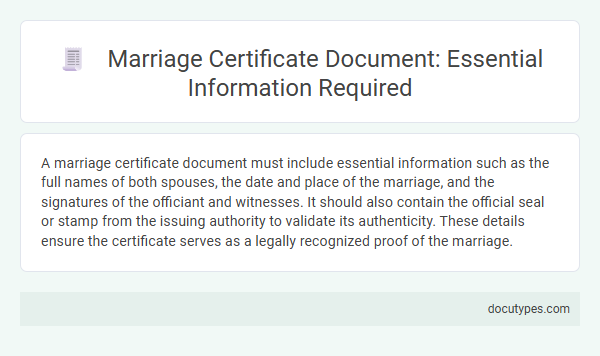A marriage certificate document must include essential information such as the full names of both spouses, the date and place of the marriage, and the signatures of the officiant and witnesses. It should also contain the official seal or stamp from the issuing authority to validate its authenticity. These details ensure the certificate serves as a legally recognized proof of the marriage.
Overview of a Marriage Certificate Document
A marriage certificate is an official document that verifies the legal union between two individuals. It includes essential details that confirm the identity and marital status of the parties involved.
- Full Names of the Parties - Both parties' full legal names are recorded to establish identity.
- Date and Place of Marriage - The exact date and location where the marriage took place are documented.
- Signatures and Witness Information - The certificate includes signatures from the couple, officiant, and witnesses to validate the marriage.
Legal Importance of a Marriage Certificate
A marriage certificate document must include essential information such as the full names of both spouses, the date and location of the marriage, and the officiant's details. This legal record validates the union and is crucial for matters like name changes, spousal benefits, and inheritance rights. You should keep your marriage certificate safe as it serves as official proof of your marital status in various legal and administrative processes.
Mandatory Personal Details of Spouses
A marriage certificate must include mandatory personal details of both spouses to ensure legal recognition of the union. Essential information typically consists of full names, dates of birth, and places of residence.
Other required details include the spouses' occupations and marital status prior to the marriage. The document also records the date and location of the marriage ceremony to validate the event officially.
Essential Identification Information
| Essential Identification Information | Description |
|---|---|
| Full Names of Both Parties | The exact legal names of the individuals getting married, including first, middle, and last names as they appear on official documents. |
| Date of Birth | Each party's birthdate to verify age and eligibility for marriage. |
| Place of Birth | City, state, or country where each person was born, providing additional identity verification. |
| Current Address | The residential address of each spouse at the time of marriage, important for legal jurisdiction and record-keeping. |
| Marital Status | Declaration of whether you and your partner are single, divorced, or widowed before marriage. |
| Parents' Full Names | Names of the bride and groom's parents, often including the mother's maiden name for genealogical purposes. |
| Marriage Date and Location | The official date and place where the marriage ceremony is conducted and recorded. |
Parent and Witness Details
A marriage certificate must include essential parent and witness details to ensure the document's validity. Your record will reflect accurate familial and testimonial information critical for legal recognition.
- Parent Names - Full names of both parents of the bride and groom are required for identification and genealogical records.
- Witness Signatures - Witnesses must sign the certificate to confirm the legitimacy of the marriage ceremony.
- Witness Identification - Details such as full names and addresses of witnesses are necessary to verify their authenticity and role in the marriage.
Date and Place of Marriage
The date of marriage is a critical detail listed on your marriage certificate, marking the official day the union was legally recognized. This information ensures the certificate serves as valid proof of the exact timing of the marriage.
The place of marriage must be clearly indicated, specifying the location where the ceremony took place. This detail is essential for legal and historical records, confirming the jurisdiction in which the marriage was conducted.
Marriage Registration Number
A marriage certificate contains crucial details that validate the union legally. One key element is the Marriage Registration Number which uniquely identifies your marriage record.
- Marriage Registration Number - This is a unique alphanumeric code assigned by the civil authority to record your marriage officially.
- Identification Purpose - The number helps government agencies and institutions verify the authenticity of your marriage certificate.
- Record Tracking - It enables easy retrieval and tracking of marriage records within official databases.
Ensuring the Marriage Registration Number is on your marriage certificate is essential for legal and administrative processes.
Required Supporting Documents
A marriage certificate requires specific information to validate the union legally. Essential details include the full names of both parties, the date and place of the marriage, and the officiant's name.
Required supporting documents typically consist of valid photo identification such as passports or driver's licenses for both individuals. Proof of termination of previous marriages, like divorce decrees or death certificates, must be provided if applicable. Some jurisdictions also require birth certificates to confirm age and identity before issuing the marriage certificate.
Common Errors to Avoid
A marriage certificate document must include essential information such as the full names of both spouses, the date and place of the marriage, and the officiant's details. Common errors to avoid on a marriage certificate include misspellings of names, incorrect dates, and missing signatures, which can cause legal complications. Ensuring accuracy on Your marriage certificate is crucial for its validity and future use in official matters.
What Information Is Required on a Marriage Certificate Document? Infographic

